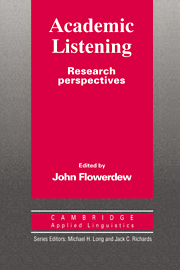Book contents
Series editors' preface
Published online by Cambridge University Press: 05 October 2012
Summary
English is one of the major languages of tertiary education and academic discourse, both in English-speaking and non-English-speaking countries. It is the language of university lectures as well as the commonest language used in international conferences and seminars worldwide. Comprehension of spoken academic discourse by non-native speakers of English is, therefore, an important issue in the acquisition and dissemination of scholarly knowledge and the promotion of academic exchange.
The nature of listening comprehension in such settings, however, has received relatively little attention among researchers, compared to the large amount of research that has been directed at the nature of written and spoken discourse and second language reading comprehension. The present volume is, therefore, a welcome addition to our understanding of the nature of academic listening in a second or foreign language. It contains a valuable series of original papers which illustrate both research findings in lecture comprehension, and a variety of research approaches which can be used in the study of academic listening. Issues covered include quantitative and qualitative approaches to the investigation of academic listening, processes employed by listeners in understanding academic discourse, the discourse structure of lectures, and the testing and teaching of academic listening skills.
The present book will, therefore, be of great interest to teachers, applied linguists, curriculum and materials developers, researchers, and all those interested in the nature and comprehension of spoken discourse. It provides an invaluable source of theory, research fundings, and pedagogical approaches that can be used both in investigating and teaching academic listening in a second or foreign language.
- Type
- Chapter
- Information
- Academic ListeningResearch Perspectives, pp. ixPublisher: Cambridge University PressPrint publication year: 1995



